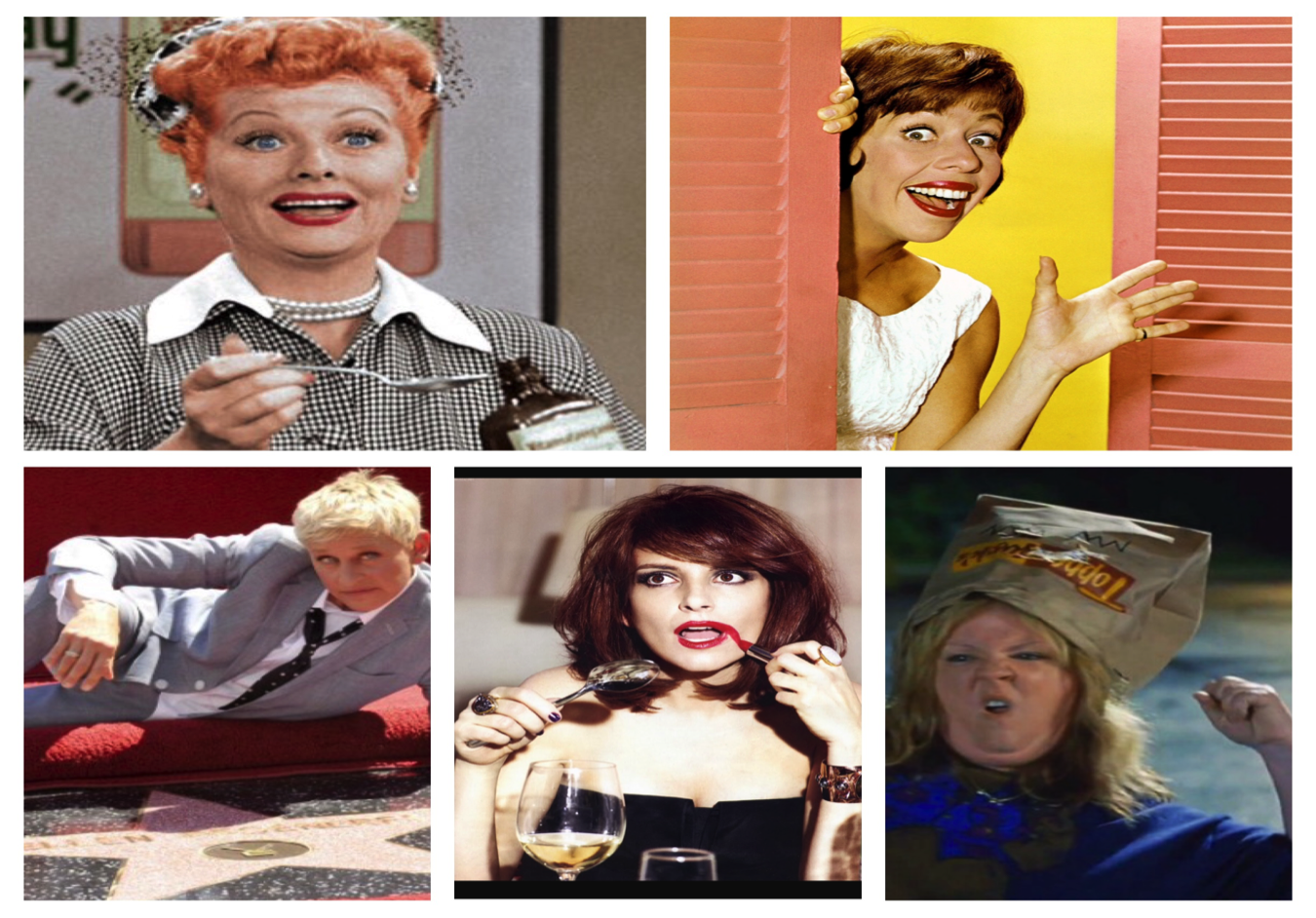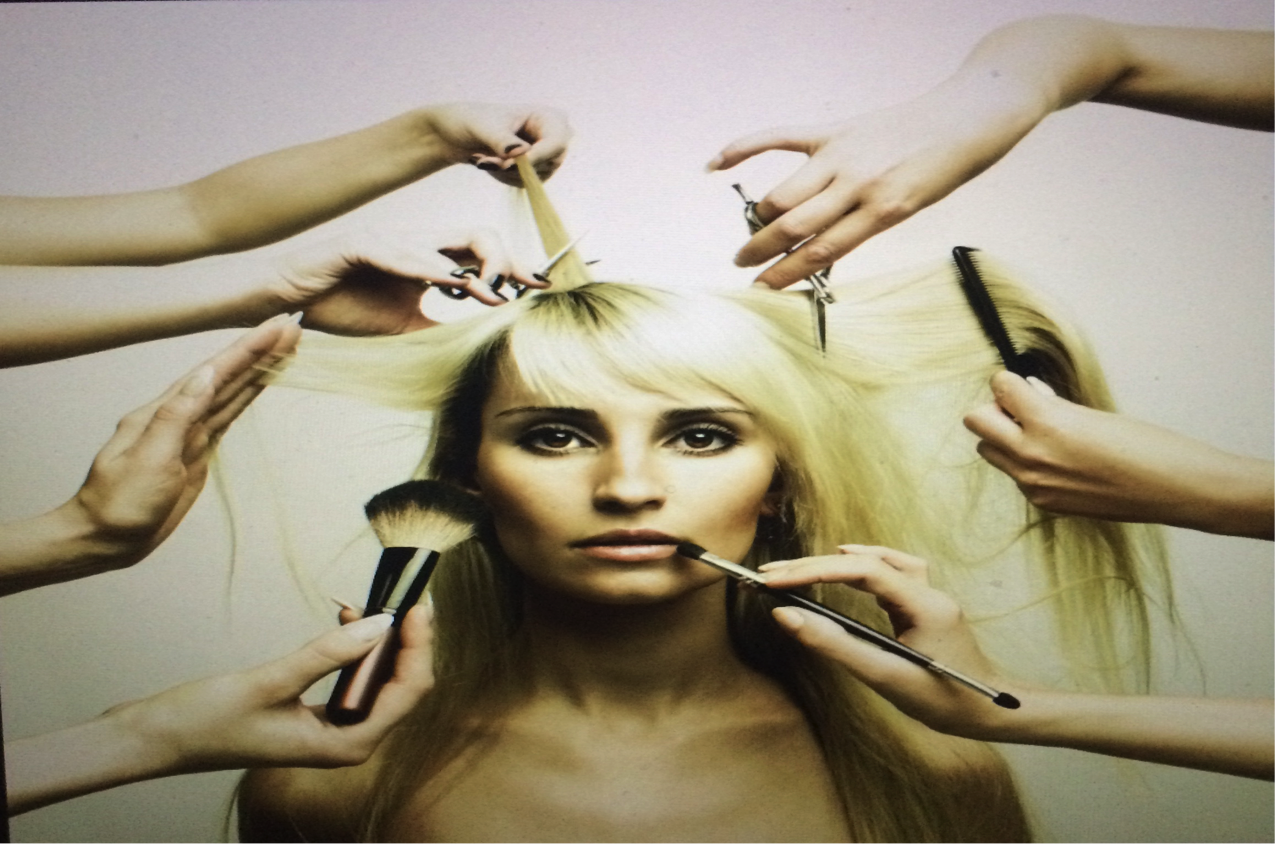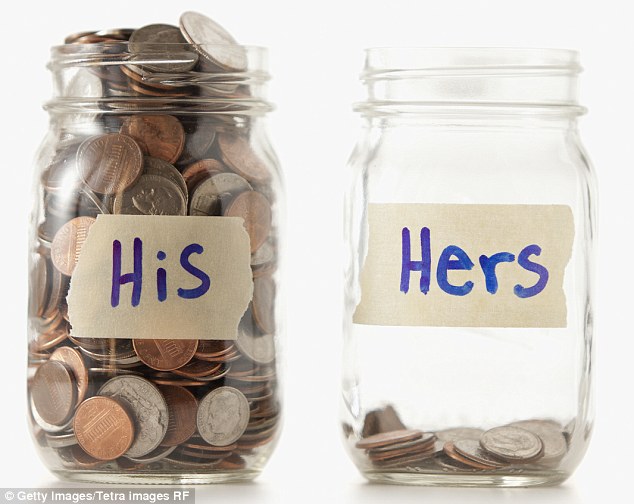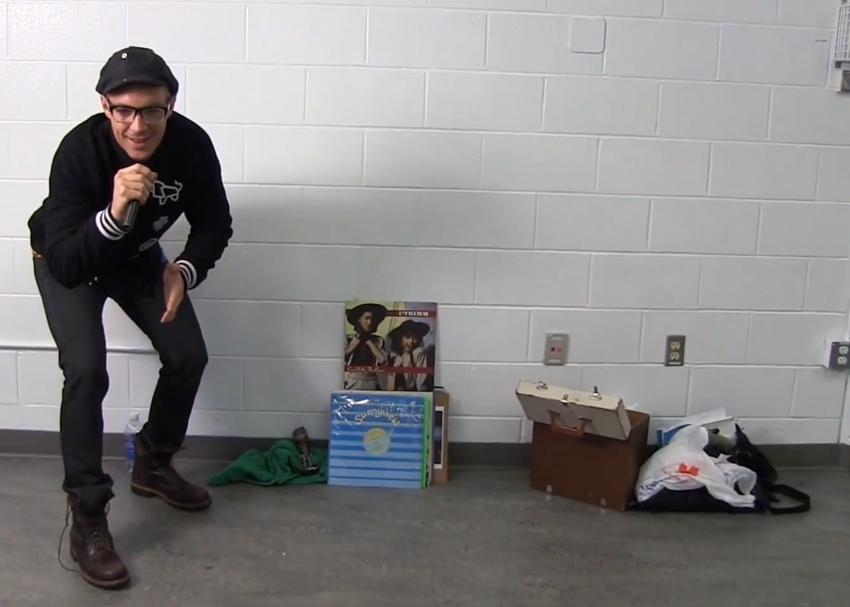Influential Women in Television History
Influential women in television history such as Lucille Ball, Carol Burnett, and Ellen DeGeneres have served as idols for girls, young women, aspiring actresses and female comedians. These women have helped to shape the general population of women and their sense of strength and empowerment. Here is a list of 5 examples of strong women in tv history who played powerful roles both in front of the camera and behind the scenes:
- Lucille Ball —> Lucille Ball is often publically conceived as the ditsy house wife on the widely beloved 1950s sitcom I Love Lucy. However, Lucille Ball’s wildly popular and hilarious stage presence through physical comedic style shows Lucy’s characteristics as a smart, funny and talented actress and comedian. Yet, Lucy was not only a strong example of a successful female comedian and actress during a period where comedic television was brand new; but Lucy also accomplished roles of film-studio executive and producer. Roles such producer, director, writer, studio executive are titles that women typically didn’t have the chance to explore.
- Lucy’s initiation into television production roles began soon after she met her husband, Desi Arnaz. The pair took their “I Love Lucy” act on the road after CBS decided against taking on Lucy and Desi’s. But eventually, CBS agreed not only to put “I Love Lucy” on the air. The network allowed Lucy and Desi to create the show with their own vision; and to do so under the couples new created production company, Desilu Productions. Her start in the business and creation side of on-screen broadcasting as a television producer reflected Lucy’s intelligence and strength as a leading lady in television.
- Carol Burnett —> Actress and comedian Carol Burnett continued to pave the way for strong, funny, intelligent women in television. Burnett started her on-screen career in the mid 1950s, and continues to work into today. Among the dozens of roles she took on, one of Burnett's most memorable was on the Carol Burnett show. As Host of The Carol Burnett Show for over 10 years, Carol had total control in producing on her show. Her vision was for The Carol Burnett show to be a variety show, a show comprised up of sketch comedy. That idea was followed through. The Carol Burnett show presented some of her best comedic material and skits. Furthermore, Burnett's content influenced the world of on-screen variety shows.
- Burnett also formed a comedic duo with Lucille Ball in a few episodes of The Lucy Show and Here’s Lucy. Both Lucy and Carol worked so well together because they of their similar comedic style, and the wit and intelligence they employed in their roles as actresses.
- Recently, Carol Burnett guest starred on the Tonight Show Starring Jimmy Fallon. During the interview, Fallon flashed back to a clip of Carol on the Carol Burnett show. In the scene, there was an actual earthquake while on set. But despite the fear and alarm on set, Burnett used her quick wit to push the scene forward and make the audience laugh. She stated, “No visiting, the earth just moved. See what happens when you pay attention?” It is this kind of quick fire reactions that gave viewers the sense of how powerful actresses like Burnett were. She was more than just an actress, Carol Burnett was a visionary in creating as well as executing comedy in television.
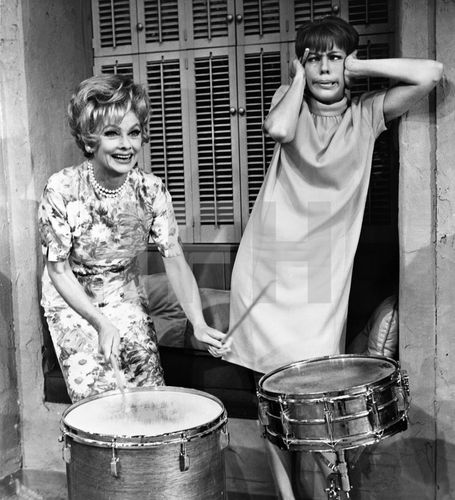
- Ellen DeGeneres —> Ellen DeGeneres professional career as an actress and comedian began in the late 1980s. DeGeneres typically stuck to the small screen in television shows that she starred in as well as episodes of other series. But her comedic wit and her love for laughter would empower Ellen to become a writer and producer, as well as a host, of her own talk show.
- Ellen’s sitcom from 1994-1998 was one of the first tv shows to feature a leading female role where the character is gay.
- The Ellen DeGeneres show originally aired in 2003 and still continues with live broadcasts today; with over 10 years later with nearly 2,000 episodes. In which Ellen DeGeneres portrays strength as an actress, comedian, content creator, producer, writer, and host. Her efforts to make television a better place for the LGTBQ community and for women will continue to shape and influence both; as well as impact both groups and their abilities to work in television, in which ever role they seek out. Just as Ellen's fellow female comedians Lucille Ball and Carol Burnett did so elegantly before her.
- Tina Fey —> In addition to her professional career as a comedian and actress for the past 15 years, Tina Fey is involved behind the screen as a producer and writer for both television and movies. Among her most noteworthy works, one includes Fey's positions of Writer and Head Writer on Saturday Night Live from 1997-2006. Fey is also credited as the creator for the series 30 Rock and The Unbreakable Kimmy Schmidt; shows that Fey also produced and contributed to as a writer. Fey’s roles in television exemplify her dedication, determination, intelligence, and natural talent to be a leading women in television both on screen as well as behind the scenes.
- Melissa McCarthy —> Melissa McCarthy has established a professional career as an actress since the late 1990s. But it was only within the past 5 years that the audience have had the opportunity to experience McCarthy’s flare as a comedian. Similar to Ball and Burnett’s style of comedy, Melissa employees a physical sense of comedy. Some of the recent movies that she's obtains major roles in include: Identity Thief, The Heat, Tammy, Spy, The Boss. Just to name a few.
- Melissa has accomplished much more than staring in these comedic films. McCarthy plays creative, behind the scenes roles of producer and writer in movies such as The Boss and Tammy. Melissa McCarthy is also working on a film project called Life of the Party, which she also wrote and produce. Additionally, she also has experience directing in a handful of episodes on a show that McCarthy stars in called Mike and Molly.
- McCarthy’s continues to accomplish roles as a successful female comedian. Yet, it doesn’t end there. Melissa continues to follow in the foot steps of great female comedians, actresses, and creators like Lucille Ball and Carol Burnett. McCarthy does this by creating content. She creates humorous story lines and scenes and knows how to capture and execute these comedic moments.
These are just a few examples of the witty, intellectual, determined female visionaries that drastically influenced and shaped t.v. history. What women in television do you idolize or inspire you? Let us know in the comment section below.
Makeup: Creative or Crippling
Makeup first seemingly appeared a in Ancient Egypt, smudged around the eye in what we today would call eyeliner. But back in the early ages of BC, Egyptian women used kohl. Kohl is a substance made out of easily accessible resources at the time. Such ingredients include lead, ore, copper, burn almonds and ash, among a few others. Kohl became the first true female makeup product, used as eyeshadows and an eyeliner. Kohl is also seen as an ancient eyeliner in India during the Gupta Age from the 3rd to the 5th century A.D.
This cosmetic also became popular as an eyeshadow in Ancient Greece. Believe it or not, having a unibrow in Ancient Greece was considered to be a thing of natural beauty. Greek women during this period even went so far as to cosmetically apply fake animal hair in between their brows.
Lipstick has been existent since prehistoric times, using it as a lip taint and made from natural resources. Such material includes fruit and plant juices, and even animal blood. It it also noted that Mesopotamian women were the first true creators of lipstick. They used a method of crushing jewels to make it into bold lip stains. Lipstick gained popularly in Ancient Egypt and Ancient China. Yet, it was the Elizabethan era that lipstick gained a stronger global popularity. A strong lip was the feature that stood out the most. It contrasted the pale, powdered skin, to appear more pale, and the lack of eye makeup and eyebrows.
We then skip to the Victorian Era, where minimal to no makeup was valued in society. Women who could afford it, used face cleansers to achieve the look of clear, young, and healthy skin. Any type of rouge or blush during this period could be viewed as tacky or pertaining to low class.
[youtube id="g08-_NExOX0"]
From the beginning of makeup during the prehistoric era, cosmetics have been made to change an individual's appearance. Hunters used makeup to better camouflage themselves while tracking down prey. Others employed cosmetics to show their devotion to their gods and their beliefs. Even Ancient Egyptians used eyeliner as a statement of class and power, in both men and women. Some scientific research even suggests Egyptians may have used it as a preventative for bacterial infections. But somewhere along the way, makeup became a social pressure and an expectation for women to wear makeup.
Makeup is becoming more openly accepted for men to have the creative freedom to explore and use makeup. However, the concept around makeup can be crippling for women. Women are expected to live up to higher standards than possibly attainable. Many boys and men don’t have the social pressure put on them of in terms of wearing makeup. However, this does not mean that that isn’t a social pressure of conformity in itself for men.
One study showing men and women’s skin reveals that women having a lower pH in terms of their skin. This means that it is overly acidic and oily in nature. Such a report of genetically born females tends to be linked to female hormones, menstrual cycles, and pregnancy. The pressure for females to have “perfect” skin is a struggle and is unbearable for many women.
I remember getting ready for a party once. I was so upset with the appearance of my skin after picking at it all week. Despite trying to cover it up, I just couldn’t. I ended up staying in my bed in the dark, and watching Gilmore Girls re-runs all night. All I could think about was that I didn’t want a room full of people looking at me and thinking “ew.” Even though that is completely untrue and no one could give a single fuck about what my skin looked like. But my own psychological obsession around this concept of women needing to have perfect skin to openly co-exist was falsely stuck in my head.
While makeup can be fun to experiment with, I believe that the conceptions surrounding painting your face, so to speak, should be fun. It should not a social pressure or a fear of not looking up to other’s standards when in public. The presumption that all women have to walk around with defined brows or a sharp winged eyeliner or contouring that is “on fleek” every time they walk out of the house is ridiculous. While all of these cosmetics may enhance your beauty, it is not the foundation of your beauty. You are.
Women AREN'T Equal Yet
Recently, I posted about the issues college graduates face after the ceremony is over and they begin the struggle to find a job. However, the injustice of the job market is more complex than this.
In the past 25 years, equality for men and women in the workplace seems like it has come a long way. However, as the statistics show, this is not the case. In 1990, it was reported that the difference between male and female college graduates was an hourly wage of $17.78 (men) and $16.45 (women). In 2015, it was reported that college educated men gain an hourly wage of $19.64, while their women “counterparts” only obtain an intake of $16.56 an hour. Not only has the gap between male and female college degree holders widened, but women have only come so far as a 10 cent increase over the past 25 years. Both sexes have gone through college, and have the same debt to settle, yet one will presumably be debt free soon simply because of the sex they were born into.
There are various factors that are considered when understanding how this pay gap is broken down. Every state has a different median annual earning, and every state has a different gap percentage. While Washington D.C. has established a 90% pay gap between men and women as of 2014, the numbers are different everywhere. On the lower side of the spectrum is Illinois, for example, where women earn only 79% of men’s wages for full-time employment. Such prejudices are not only limited to sex, but also include a wage gap of race and ethnicity. The fracture in income between an African American woman and a white man is 63%. The difference between Hispanic or Latino women and white men is nearly 56%.
So how can we push forward to solve this issue? We need to put in place an equal payment plan for every individual, regardless of sex, race, or ethnicity. Whether that be taking the gap money between men and women and ethnicity, and at the very least splitting it equally among everyone. Or increasing womens’ pay to what they rightfully deserve. Either way, the system demands change, and this would be a start.
Yesterday, my mother told me that this goal would never happen by the end of her professional life-time. How can we strengthen organizations like the National Committee on Pay Equity, whose annual equal pay day was celebrated just last month. And yet made up holidays like sibling day, which is two days before equal pay day, get more buzz. Why is this critical issue seemingly tossed aside? We need to start by spreading the word. Talking and strategizing are the key to educating others, which is the first step in making this idea a reality during our lifetime. The change starts with you, the one person that can change your situation and help lend a hand in changing others’ circumstances.
[youtube id="9ilSeJ6B5ro"]
As Daniel Craig once said, “Women are responsible for two thirds of the work done worldwide, yet earn only 10 percent of the total income and own 1 percent of property. So, are we equals? Until the answer is yes, we must never stop asking.”
[Video] Nardwuar Vs Diplo
Nardwuar has become a must-stop for any artist rolling through Vancouver on tour or for a show for awhile now, keeping a steady stream of Q+As coming from our neighbors to the north. Most recently, he linked up with Diplo, in town for Contact Festival back in late December, to discuss the ins and outs of strip clubs, take a trip down memory lane with an old photo of the two, and get into a spirited discussion over who really discovered a certain EDM DJ. Towards the end, Nardwuar gets a bit of a surprise before a fitting exit. Nardwuar interviews never disappoint, and this installment is no different. Check it out here below.
[youtube id="SoIWg2I842w"]

